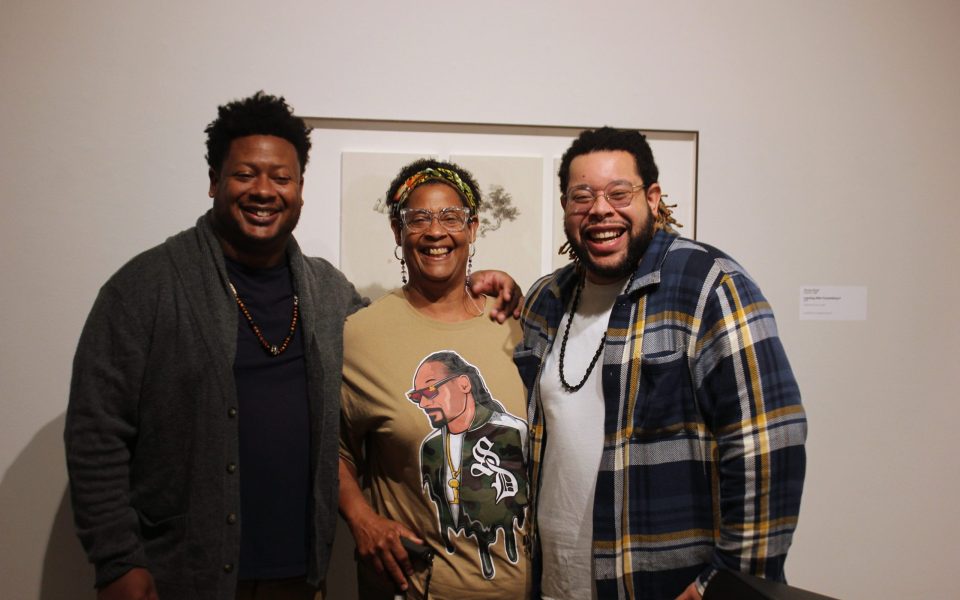Featured photo: Writer Steven Dunn and rapper DrewShamir pose with Dunn’s mother at Winston-Salem’s Hanes Art Gallery on Oct. 2. (photo by Sudarshan Krishnamurthy)
“Hey yo, it’s poison,” DrewShamir called out, referring to a popular Nas lyric as he moved about the space. The colors worn by those in attendance popped as though they were a vibrant image cast against a plain backdrop, not unlike the Navajo wool tapestry that hung on the gallery wall nearby.
“Hey yo it’s poison”, he repeated.
The musician, who is from Greensboro, chose the lyric on purpose, explaining how the words represent sentiments that many within the Black community share. Concerns around recreational drug use, the American education system, modern medicine and more.
The audience sat in the midst of art hanging on the walls as they listened to DrewShamir and writer Steven Dunn in Winston-Salem’s Hanes Art Gallery on Oct. 2. The Dillon Johnston Writers Reading Series at Wake Forest University had invited Dunn to share a reading from his forthcoming book on the musician, Nas, as Dunn’s cousin, DrewShamir, came to share music he had written to accompany the book.

“I listened to who I thought was the greatest,” Dunn said, explaining his affinity for the rapper. “I’ve been listening to him my whole life, and it’s what I went back to when I first started being a writer.”
Nas, a rapper who began his musical career in 1989, grew to popularity through the nineties and early 2000s for his pointed lyrics that spoke to life as a Black man growing up in New York. He’s frequently cited as one of the greatest rappers of all time. And that’s what drew Dunn to focus on him as his subject for his book, which does not yet have a title.
As Dunn read, the packed audience hung on his every word, laughing, as if on cue, at Dunn’s wit and way with words. He told stories about his own travels with his kid and how they reminded him of certain lyrics from Nas’s songs.
Then, he spoke about his mom.
He talked about how she would cook for, care for, hold space for, and make friends with everyone in sight.
“When I was little, it would take two hours to go to the grocery store because my mom would talk to everyone at the grocery store,” Dunn shared.

In the front row, she beamed up at her son as he spoke her praises. This was the first time she had attended one of Dunn’s readings.
As a person whose family is deeply tied to his identity, Dunn explained how much it meant to work with his cousin.
Dunn remembered spending childhood summers together with DrewShamir.
Collaboration, Dunn said, is what continues to bring joy into his work. The chance to write with his family or friends from kindergarten is really special to him.

As part of his contributions to the book, DrewShamir deconstructed Nas’s song, “What goes around comes around,” describing it as a “handbook of his lyrical prowess, along with a demonstration of his ability to deliver introspective thought from the perspective of many people in and outside the Black community.”
Like Nas, DrewShamir has become known for his thoughtful approach to music, something that was reflected in his analysis of one of the greatest rappers.
“One thing about Nas’s skillset is that he has the ability to paint a vivid picture for the listener through relatability or simple description of the scene or situation,” he explained.
In the song, Nas points to the myriad of ways in which the Black community exists under the heel of systemic oppression: schools, drugs, religion, crime. Then, the song points its sights on corporations.
“It’s funny how these black killer companies is making money off us,” the song goes. “Fast food, cola sodas, skull and bone crosses. Hey yo, it’s poison.”

More than two decades after the release of the song, Dunn and DrewShamir dissected and delivered the ways in which Nas’s insights continue today.
“I was a little Black kid who grew up in poverty in the worst educational state in the country,” Dunn said of his home state of West Virginia, “and the lowest educationally ranked county within that state.”
But that’s the beauty of so much of hip-hop, DrewShamir explained. He loves that the genre transcends generations and often, “grandkids and their grandmothers can sometimes be listening to the same song.”
For him, just like he connects to Nas’s songs decades later, he hopes those listening to his lyrics feel just a little less lonely and a bit more understood.
“I knew early that something is not right in the grand scheme of the world we live in,” he said.
But together, through words and song, that burden could be shared.
Learn more about DrewShamir’s music at drewshamir.bandcamp.com. Learn more about Steven Dunn at stevencdunn.com.
Join the First Amendment Society, a membership that goes directly to funding TCB‘s newsroom.
We believe that reporting can save the world.
The TCB First Amendment Society recognizes the vital role of a free, unfettered press with a bundling of local experiences designed to build community, and unique engagements with our newsroom that will help you understand, and shape, local journalism’s critical role in uplifting the people in our cities.
All revenue goes directly into the newsroom as reporters’ salaries and freelance commissions.


Leave a Reply